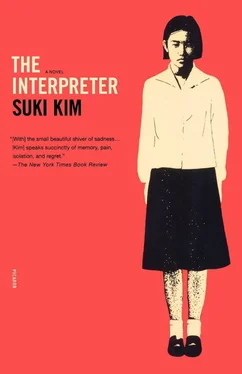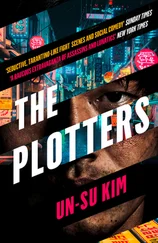They never did move to Bayshore, and Long Island remained a distant place she never thought much about until shortly before the funeral, when she was told that the ashes would be scattered over the Atlantic from the Montauk Lighthouse. She thought it was a bizarre idea; there had been no will, and she had not realized that her parents had ever been to Montauk. Grace would not explain, and everyone assumed that it was fully discussed and understood between the two daughters. When Suzy pressed the matter, Grace cut her off in mid-sentence and snapped, “That’s what they wanted; since when do you care about their wishes?” Suzy took the LIRR to Montauk three days later and watched Grace scatter the ashes. Suzy merely walked alongside Grace and let her conduct everything, as the older child, which was what her parents would have wanted, she thought. There were only a few people who seemed to have known her parents through work, and a reporter from the Korea Daily who showed up uninvited. It was exactly five years ago. November, rain, and her entire world had just ended.
Why Montauk? No one told her anything. Maybe Mom had mentioned something about it to Grace, or Dad had left a diary somewhere in the back of filing cabinets, or Grace knew things about their parents that Suzy did not—but it was a mystery, and there was no one Suzy could ask other than Grace, who, even five years later, would not speak to her. The one thing Suzy knew was that Grace disapproved. Grace was a fervent Christian, and burning the body was unacceptable. If Grace had had her way, they would have been buried in a sunny lot somewhere in New Jersey, preferably near her own church, where the funeral was held, as though her parents had ever believed in Christ.
Her parents had been floaters. They went to churches on a whim. Good for business, Suzy thought. They always had a specific reason for each visit. Either a job connection from one of the elders or trade gossip or market information. A church was where most Koreans gathered on Sundays, and it would have been foolish to ignore its usefulness. But they were atheists at heart. More than once, she overheard Dad cursing off Christians. “Bastards,” he’d say. “They’d even give up their own mother if they thought it would guarantee a spot in that nonsense called heaven.” Sometimes Mom would say a prayer to Buddha when Suzy or Grace got sick, or Dad would say something about the ethics of Confucius at the dinner table, which all seemed confusing somehow, but the message was clear: Jesus was not for Koreans. One night, Suzy walked into the kitchen to find her father in a heated argument with someone on the phone and overheard only the last bit before her mother pointed to her to get back in her room. He was screaming into the phone, “Your ancestors would weep if they knew you were pushing this Christ shit on your countrymen!”
“Ancestors”—that was a familiar word. Suzy heard it again and again while growing up. If she got a B instead of an A on a test, the shame lay on her ancestors, who watched from their graves. If Suzy and Grace fought and did not speak for days, it was again the ancestors, who lamented over these descendants who were not only girls but bad-mannered as well. And of course it was due to the watchful eyes of the ancestors that Suzy and Grace were forbidden to speak English at home. “You must never forget your language; once you do, you no longer have a home,” Dad told them. It was not easy to keep on speaking Korean when English came so naturally, and Suzy and Grace often cheated, falling into English when their parents were not around. But in the end, Dad got his way. Ancestors or no ancestors, the girls never forgot Korean. They were even sent to a Korean-language school every Sunday afternoon, though there was almost no need. The girls spoke Korean with near-fluency.
The train is slowing down again. Everyone is getting up at once. Outside, the sign reads “Jamaica,” a stopover station with several platforms. The morning started out overcast, and now the sky is turning black. Each time she comes out here, the rain follows. Or perhaps she has come only when it was raining. With each year, she can bear the rain even less. It makes her terribly aware of being alone. Her father had said that remembering one’s own language ensures home, but was that true? She wonders if her parents would approve of her coming out to see them so often. Suzy at twenty-nine, still single, still careerless, still stuck with a married man—would they turn away in shame?
From here on, it is a smooth ride. Two hours and fifty minutes, and the train will arrive in Montauk.
Once she boards the second train, she shuts her eyes and pretends that this ride will continue forever. She is on her way to see Mom and Dad. She imagines their new home, a pastel oceanfront house they have just moved into. Dad’s newest whim, the beach, the lighthouse, the moonlight, the edge of New York. “Oh, who would’ve ever thought,” Mom would say, laughing, picking up Suzy at the train station in her brand-new Jeep. Mom behind the wheel in her Christian Dior sunglasses and a sky-blue tank top with tan lines showing through its straps despite the November rain, while Dad is out fishing for fluke, which he would then get the local fishermen to fillet for sushi later. Suzy would present them with a bag of Korean groceries, which her parents would delight in opening; Montauk is not Flushing, definitely not Woodside or Jackson Heights, no Oriental goods within miles. They would gloat over a jar of kimchi , dried squid, salted pollack eggs. They would laugh like children, and Suzy would squint from so much sun in their faces. But then, always, Suzy remembers that she is nineteen still, and college is not easy at all, and she’s come home to tell them: Dear Mom and Dad, I don’t want to stay in school anymore, I’m afraid of the rules and of breaking them all, I’m afraid of the boys who want me and the men I desire in return, I’m afraid of being stuck out there and not finding my way back unless I hide with you for a while, stay in the bedroom upstairs, and let you take care of me, I will wait for you all day while you fish, while you sunbathe, I will mop the floor and vacuum the living room and even fillet the fish if I can stay just a few nights or weeks or years until I am okay, until I can stand on my own and chase her away who stands in dark with wet hair and a cigarette, afraid of the phone that keeps ringing, until her fingers turn red from the ashes.
The screeching of the engine signals a stop, and Suzy looks out through the rain-streaked windowpane to find one of the Hampton towns. Even in November, she can spot the white-and-khaki ensemble on the platform. This part of Long Island has nothing to do with Bayshore and its Korean immigrants. This is Ralph Lauren land, the crème de la crème of Madison Avenue. “Why call this a country? Disneyland would be more accurate!” Damian ranted as they drove across the entire coastline one summer in search of the antique shop where the missing Edo print was found. It was a research trip for the book he was working on. Suzy thought he was overreacting, but she liked that about Damian, his refusal to forgive the tiniest flaw or weakness. She believed that it was a sign of honesty, his unwillingness to compromise, his search for the ideal. She admired his intrepid pursuit of beauty, which she thought was his faith in love, the very essence of what she lacked.
The first time they made love, Damian began with her hands.
I’ve always believed that a woman’s hands should tell me nothing, to keep me from the rest of her, but you, yours surprise me, a sign of temper, tenacity, such long, angry fingers.
He was running his index finger across her face. He was whispering the whole time. He kept talking, not so much to her as to himself, as though it was he who needed convincing.
Читать дальше












